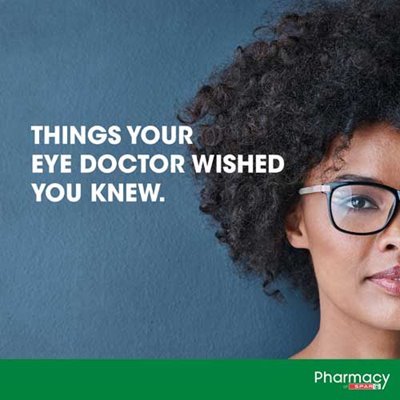Things your eye doctor wishes you knew

Your vision is something you should never take for granted. Regular visits to an optometrist are essential for good eye health.
KIDS NEED EYE EXAMS EARLIER AND MORE THAN EVER BEFORE
Although, people tend to have more vision problems as they age, children need eye exams to ensure healthy vision too. Currently less than 15 % of preschool children get an eye exam and less than 22% receive vision screenings (CDC, 2016). The most common cause of vision loss in children is amblyopia (2 to 3 children out of 100 children affected) and without prompt treatment this can be permanent. The key is timely detection with a comprehensive dilated eye exam that starts early on.
MOST EYE DISEASES DO NOT HAVE SYMPTOMS UNTIL IT’S TOO LATE
As we age, eye diseases are more common and often go unnoticed for a long time before symptoms arise. During a regular eye exam, age-related eye diseases are detected including cataracts (clouding of the lens), diabetic retinopathy (damaged blood vessels in back of eye), glaucoma (progressive optic neuropathy) and age-related macular degeneration. Early treatment is critically important in preventing permanent vision loss or blindness. Waiting for symptoms to occur before seeking eye care decreases your chances of preserving your sight.
CARROTS ARE GREAT, BUT SO ARE OTHER NUTRIENT RICH VEGGIES
People often ask if carrots really do give you good vision. They can—carrots contain vitamin A, which helps the retina function properly. But the ultimate plate for eye health would be packed with foods they wouldn't expect: green leafy vegetables (like kale, spinach, and broccoli), which can help fight macular degeneration, a chronic condition that can cause your vision to worsen as you age; types of fish that are rich in omega-3 fatty acids (like salmon, mackerel, and tuna), which protect against dry eyes; and citrus fruit, which promotes retina health.
GLAUCOMA ISN'T ONLY FOR THE ELDERLY
Most people assume that glaucoma is a disease that happens to the elderly. But glaucoma can happen at any age—even children get it—and your genes play a big role. If you have a first-degree relative with the disease, you're more likely to be diagnosed. (There are a number of eye conditions that run in families, so pay attention to them just as you would high blood pressure or diabetes.)
Often glaucoma has no symptoms, but eventually you can suffer visual field loss, especially in the periphery of your eyesight, so it's important that you get checked even if your vision is fine.
Related Articles
Your diet can improve your eyes
What is diabetes?
Article Source
https://www.redbookmag.com/body/health-fitness/a38529/eye-doctor-advice/
https://www.eyeque.com/knowledge-center/5-tips-doctors-wish-their-patients-knew/